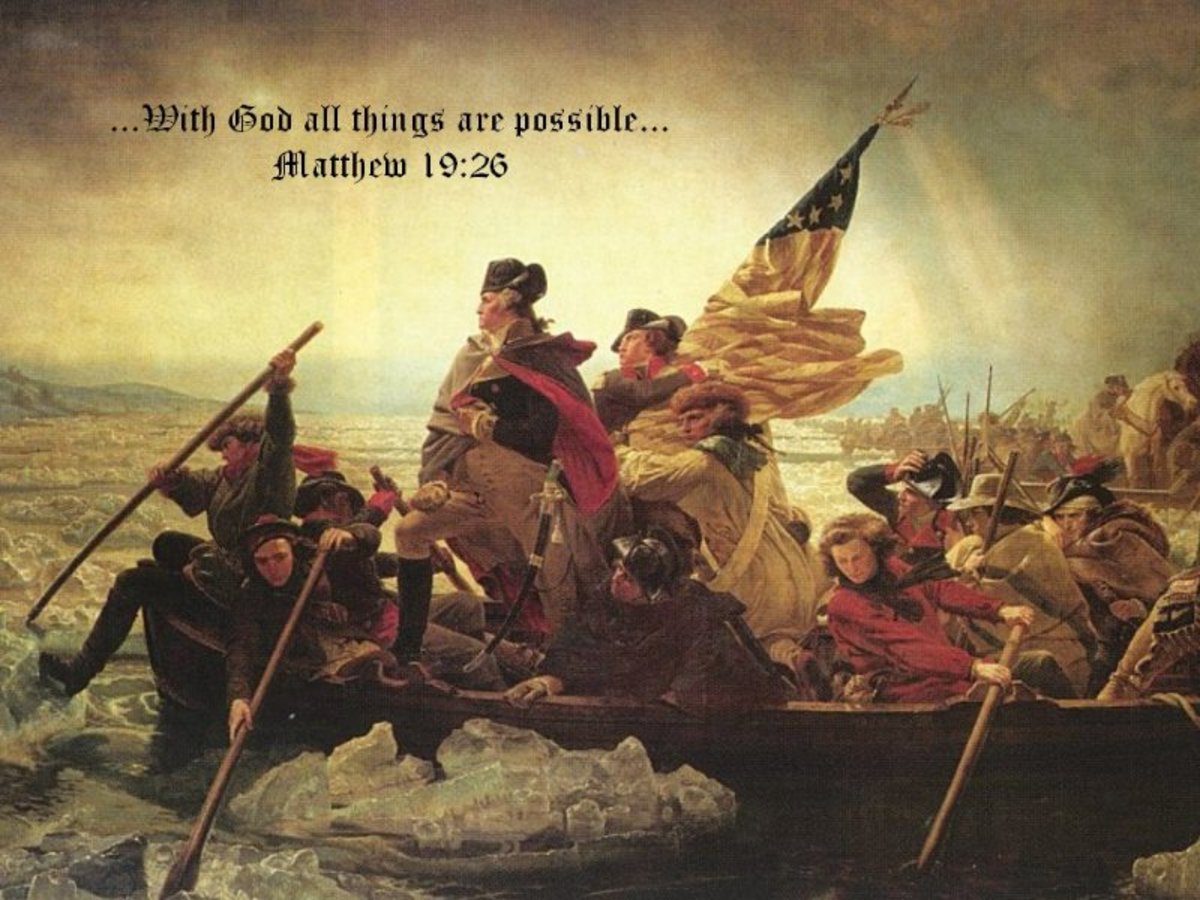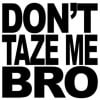Wasn’t American founded a Christian nation?
Wasn’t American founded a Christian nation?
By Christian nation, I mean that its laws and institutions were largely shaped by Christian values and ideas. The systematic study of tens of thousands of documents in founding era conclusively proves America's Christian roots. Even in a casual perusal of the Christian inscriptions on monuments and buildings in Washington DC show overwhelming evidence for America's Christian heritage.
- JThomp42posted 12 years ago
0
Yes, to contrary belief, this is the whole premise as to why they came to a new land in the first place. So they could worship freely and as they chose. People just can't stand the thought that this country was not founded as a secular nation.
The pilgrims wanted more than religious freedom, Holland was the most religiously tolerant country in Europe. They wanted to advance the Gospel to new lands.
If Holland was so tollerent, then why did my maternal family, along with others, have to flee that country, for England, about 400 years ago, because of religious persecution?
Well, there must have been a reason the pilgrim's originally fled England for Holland.
What pilgrims 'fled England for Holland'? I wasn't aware of people fleeing England for Holland, there is obviously a gap in my European history.
That's right, the pilgrim's were persecuted,fined and jailed in England for refusing to join the Anglican Church. Holland at that time was the best place they could go to be left alone.
If you want the truth about America's founders this is the best resource I know of http://www.wallbuilders.com/ and you can tell because the left comes out from under their rocks to attack and try to discredit David Barton. http://www.youtube.com/watch?v=YnFw1f6K2W8
Thank you so MUCH for the link to wallbuilders!!!
I also like wall builders as the quality of their research surpasses even that of academic research. They rely exclusively on original sources whereas many who opposed them are content to quote thier own peers.
Interesting how the Judo-Christian tradition the US was founded is just sort of ignored by history these days.
And it's no accident, there's a leftist agenda to secular America!
This doesn't have to be a black and white issue. Christianity is, and was, a major belief system in America. However, also important (perhaps more important) were the philosophies that came from the Enlightenment. Thinkers such as John Locke were very influential on the Founders and the Founding documents.
Additionally, many of the founders were deists, who in some cases specifically rejected Christianity or at least parts of it. Consider Jefferson, for instance, who made his own Bible by cutting out the parts that attributed divinity to Jesus (e.g. miracles and other supernatural elements). Deism, like the enlightenment, was based on reason rather than superstition and myth.
John Adams also rejected elements of Christianity. Take this quote for example: "The divinity of Jesus is made a convenient cover for absurdity." Adams was the President who signed the Treaty of Tripoli, which opened by saying that "the United States of America is not in any sense founded on the Christian Religion." You can't really get any clearer than that. That treaty was approved by the entire US Senate.
That doesn't, of course, mean all of Christianity was rejected. Jefferson considered Jesus to be a valuable moral teacher. But he also believed that religion was a private affair: "I have considered religion as a matter between every man and his Maker, in which no other, and far less the public had a right to intermeddle." This idea of freedom of religion is codified in the First Amendment: "Congress shall make no law respecting an establishment of religion, or prohibiting the free exercise thereof;" This is one of the most important ideals in the founding documents and is in no way a Christian, or religious, ideal.
Furthermore, the founding documents make absolutely no mention of God or the Bible. All of the terms used, such as "Nature's God" and "Creator" are non-specific terms for a divine maker that were consistent with deism.I believe the influence of Deism to be exaggerated as to our nation's founding. If your interested my Hub addresses this http://wba108yahoocom.hubpages.com/hub/ … tate-Fraud
If you go to Jefferson's own writing you will discover he was not the Deist he is advertized to be these days. John Locke was indeed influential as well.
This is true, American and British Deism existed in the framework of the Christian faith. This is unlike the athiestic french form of Deism.
The country was founded on Christian principles. But not necessarily as a Christian nation. The founders were advocates of religious freedom, and as such did not intend to mandate Christian faith. The Federalist papers demonstrated that the constitution was based upon the principles laid out in the Declaration of Independence. While the Declaration makes numerous references to faith and God given rights, the governing document...The Constitution… was specifically designed to be secular, as to preserve the concept of religious freedom. The founders were greatly concerned with the thought of a required affiliation with Church leadership of a specific faith that might be able to manipulate the masses via theocracy. Many were raised under the Church of England and had lived through such intolerance. It appears quite clear that they aspired to achieve a secular Gov't but not a secular society.
In terms of the Christian values shaping the founders views. Yes that is absolutely the case. There are countless examples Christian influence. Once such example...Madison conceived the concept of the three branches of Gov't from the bible. Specifically a verse from the book of Isaiah..
"for the lord is our judge, the lord is our lawgiver, the lord is our king, he will save us"
This was the inspiration behind the concept of a Judicial, Legislative & Executive branch.
The notion of individual rights referenced in the Declaration of Independence are said to be God Given. This means that because they are not given to you by Gov't…that Gov't cannot take them away.
"The general principles on which the fathers achieved Independence were ... the general principles of Christianity ... I will avow that I then believed, and now believe, that the general principles of Christianity are as eternal and immutable as the existence and attributes of God." John Adams
The founders were clearly influenced by their Christian faith in terms of the way in which they constructed our system of Gov’t in that it is largely based on Christian values. Unfortunately, many have attempted to rewrite history and the meaning of the separation of Church and State. While they had no intent of allowing Gov’t to require a specific religious affiliation, I think it is ridiculous to assume that they wished to prevent a child from being permitted to pray in school of their own free will. In fact that appears to me to be an invasion of the very religious freedoms they were attempting to achieve.Great answer! The Constitution was silent about Christianity largely because it was assumed that religious establishments were left up to the state governments.
The Pilgrims fled to Holland to avoid persecusion and eventually sailed to the New World. Keep in mind though our Founding Fathers did indeed want religious freedom, yet for them this freedom was primarily limited to other forms of christianity.
That's because there was nobody among them that worshiped other faiths outside of some form of Christianity. However, that does not mean they intended to ban other faiths. They were likely just unfamiliar with them.
We were founded on Judeo-Christian principles on a Constitutional Republic framework. We were not and are not a Christian nation, as that would make us a Theocracy. I am a Christian, as I am an individual who believes in the saving grace and finished work of Christ. A nation can not make such a claim. A nation can be founded on a set of principles, and ours was. Remember, many of those who first came here were fleeing a State run and State mandated National Denomination. We are free from that kind of oppression because of the 1st Amendment. This Amendment was not meant to keep faith out of the public domain, but rather to keep the government out of the church. It is a oneway separation and not the "wall" that some have come to believe.
Mitch, you'll notice that I was careful to define what I meant by Christian Nation. The Supreme Court declared America a Christian nation in 1892 and 1952.
wba, I believe we are on the same pair, I was just answering the question...

I think we are to. Maybe I shouldn't use the term Christian nation because of the confusion it creates. Maybe it would be better to say that America was largely shaped by Christian ideas and principles
- ahorsebackposted 12 years ago
0
Maybe more to the point would have been " Why is christianity alone so under attack No matter the thread , no matter the question or comment ! It seems that the simplicity of the one word , FAITH is so extremely hard to understand ! It continues to absolutely baffle the brightest minds , it continues to be the symbolic burr under the saddle of the "intellectual " delemna , I often wonder how the cool-aid of P.C. crowds everywhere requires that only Christian belief [faith] be questioned . Do these same great analytical minds baffle the Buddist beliefs , or mull over the Muslim mindset ? No ....its always Christianity !
Good question. I think you know why its under attack,
Thomas Jefferson: "Question with boldness even the existence of God; because, if there is one, he must more approve of the homage of reason than that of blindfolded faith." The founders of our nation were enlightened free thinkers whose highest value was freedom of thought and expression. The image accompanying this question with the quote "With God, all things are possible..." does not imply a "Christian" belief any more than the quote "So God is everywhere, filling all things and flowing through them forever." - Ashtavakra Gita 1: 18-20 inscribed on a monument would imply that our country was based on Hinduism. And by the way, whoever originally paired the quote "With God, all things are possible..." from Matthew on this painting seems to indicate not that our nation was founded on Christianity as much as it indicates a misunderstanding of the teachings of Christ in the world.
The founders made clear that the Founding documents reflected the will of the people and not their own private beliefs. The public meaning of what he said and did is what is relevant to the founding American values and ideas.
- Old Empresarioposted 12 years ago
0
There were several "Americas" that were founded as colonies for different reasons. The puritans who received a colonial patent from the Virginia Company in London to settle in New England were absoutely a separatist Christian theocracy. The Jamestown Colony in Virginia was interested in getting rich off of tobacco exporting and was not very religious at all, except for the fact that it was affiliated with the Church of England. The southerners were loyal to the king and followed the Church of England (or advocated religious toleration in the case of the founding of Maryland). The French who settled in Canada along the St. Lawrence River and eventually around the Great Lakes and the Ohio, Missouri, and Mississippi River Valleys toyed with the idea of establishing Catholic Missions among the Indian villages, but this did not take. The French found more profitablity in trading with the Indians for fur pelts. The Spanish, who settled Mexico, Florida, Texas, California, and the rest of the American Southwest, were interested in establishing colonies until the Spanish government kept going broke. The Spanish began relying more and more on establishing missions among the Indian villages in order to make loyal Spanish subjects of the natives. So that was sort of a Christian foundation in America. However, this rarely worked and the natives preferred the French who would give them muskets and tools in exchange for pelts. The region of New York was settled by Dutch businessmen who established estates along the Hudson Valley. They had little interest in religion.
Back to your question; by "Christian" I assume you meant Protestant Christian. And by "Protestant", I assume you don't include Lutherans, Anglicans, or Episcopalians. You're probably referring to Baptists, Methodists, Presbyterians, or separatist protestant groups, like Purtitans evangelicals, or other non-denominationals--excluding "rogue" sects like Mormons, Menonites, or Jehovah's Witnesses. My point is that Christianity has always been an important part of a large fraction of our culture. As opportunities arose, new sects cropped up. But as a nation, our institutions (until the 1950s) were extremely secular compared to those of Europe.I beg to differ, the federal government since the founding gave non-sectarian support of Christianity right up till about the 1950’s. I believe our institutions have only been secularized since the 40’s and 50’s. Non- sectarian is not secular.
Related Discussions
- 49
Do you think the Founding Fathers intended a Christian Nation?
by MPChris 12 years ago
Do you think the Founding Fathers intended a Christian Nation?This question is in specific reference to two important pieces of legislative evidence. Both, the 1st Amendment and the Treaty of Tripoli (Article 11). Keep in mind that the Treaty was ratified by many of the original founding fathers,...
- 15
I America a "Christian Nation"? What does that term even mean?
by Justin Aptaker 13 years ago
I America a "Christian Nation"? What does that term even mean?I often here that America is a "Christian Nation". Do you agree or disagree with this? And what, exactly, does that mean? Clearly, not nearly all Americans are Christians. Does this mean that a few of the first...
- 17
Was The United States Founded As A Christian Nation?
by PhoenixV 10 years ago
Was The United States Founded As A Christian Nation?
- 377
Sarah Palin Says America Is A Christian Nation
by Pandoras Box 15 years ago
What do you think? I'm not gonna argue it, though I may come in later and post my opinion, but I wondered if many people here would agree with that term as an apt description of our country. Additionally she says“Lest anyone try to convince you that God should be separated from the state, our...
- 7
Is America a Christian or pagan nation?
by allweathersforum 14 years ago
Is America a Christian or pagan nation?I am studying this issue in America today and would like to have your honest opinion. You may be an atheist, Buddhist, Christian Muslim etc…, but I would like to have your answer according to your impression of the constitution, history, and how the government...
- 78
America was founded as a Christian Nation
by Prophecy Teacher 9 years ago
Is it reasonable to assume that 13 different Christian Chartered Colonies, would send to a convention in Philadelphia a group of men - to make a Constitution - that allowed their way of life to end? Is it further reasonable to believe that those Christians picked only Deists to go represent them?...
















